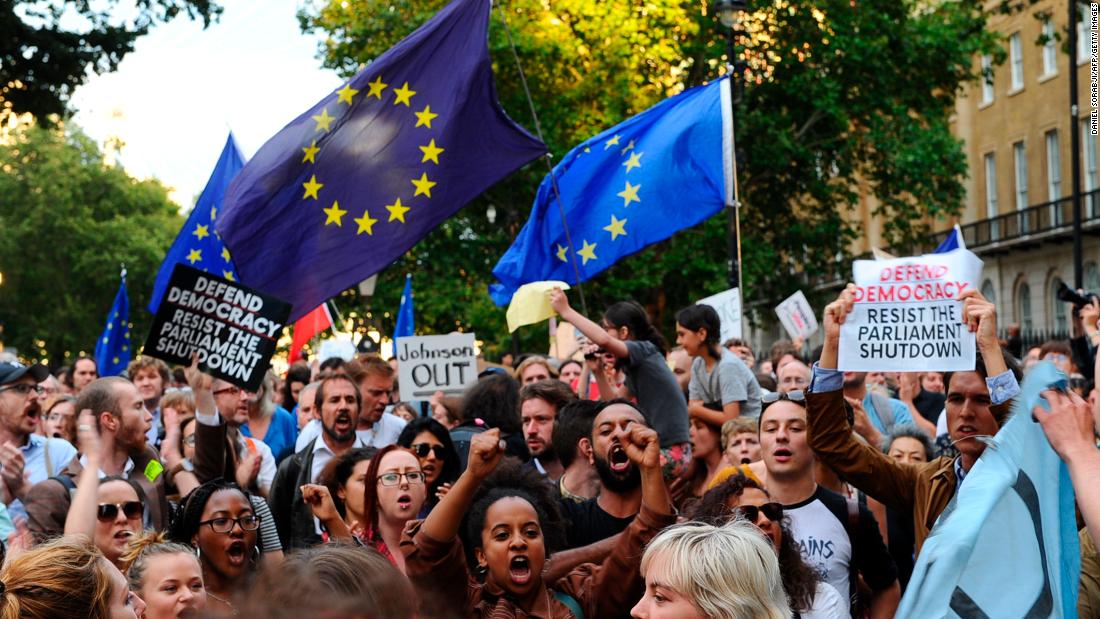Brexit is back, and investors should buckle up - 5 minutes read
 Brexit is back, and investors should buckle up
Brexit is back, and investors should buckle upLondon (CNN Business)Happy Thursday. A version of this story first appeared in CNN Business' Before the Bell newsletter. Not a subscriber? You can sign upright here.
UK Prime Minister Boris Johnson's latest maneuver to push through Brexit has been described by opponents as a "coup" and a "constitutional outrage." For investors, it's a warning sign: Ignore Brexit at your risk.
Johnson shook Britain out of its summer lull on Wednesday when he asked the Queen to suspend Parliament just days after it returns from its summer recess next week, and only weeks before the Brexit deadline on October 31.
Why it's important: The move gives lawmakers less time to block a messy no-deal departure from the European Union. Johnson has said he will take the United Kingdom out of the bloc on October 31 with or without a deal to protect trade.
The pound fell as much as 1.1% against the dollar on the news. It's trading lower again on Thursday, and remains below the $1.22 mark.
"It goes without saying ... that the next few weeks are heading into uncharted territory, " said ING's James Smith and Petr Krpata. "For the pound, all of this means further weakness to come."
grind lower Remember: Analysts expect the pound to grind lower between now and October 31. Morgan Stanley has predicted that the currency could fall to between $1.00 and $1.10 if Britain leaves the European Union without a deal in place. Sterling was at nearly $1.50 before the 2016 Brexit vote.
country into a recession The UK economy is also in a fragile state. In the second quarter, it shrunk for the first time in nearly seven years. Brexit has the potential to send the country into a recession
See here: UK car production fell 10.6% in July, the 14th consecutive month of decline, the Society of Motor Manufacturers and Traders said Thursday.
the brink of recession Investor insight: A Brexit shock wouldn't just send Britain reeling. Germany, Europe's largest economy, is also on the brink of recession , and concerns about global economic growth are rising. The last thing investors need is a jolt from the United Kingdom.
new report The US real estate market "flashed a warning sign" in the second quarter of the year, according to a new report from Real Capital Analytics, which tracks commercial property.
For the first time in seven years, overseas investors in US commercial real estate — a segment that includes office buildings and retail space — became net sellers of properties.
"These investors still purchased assets," wrote Jim Costello, the report's lead author. "They simply sold more than they bought."
No single region was responsible for the pullback, though it's notable that China slid to No. 9 in the ranking of investors. The country, which has tightened rules on capital outflows, was fourth in 2018 and third in 2017.
What it tells us: "The decline is a yellow warning sign rather than a red one because it is not a whole class of investors writing off the US," the report said. "Rather, the high-ticket price deals that these investors pursue are becoming more challenging."
raised its minimum wage Following pressure from House Democrats, has raised its minimum wage in the United States to $15 an hour. It's the last of the big American banks to boost pay for frontline workers, my CNN Business colleague Matt Egan reports from New York.
out front My surprise here is that Citi was last. The bank was out front earlier this year when it said that women at Citigroup made nearly 30% less than men worldwide. It was the first major US bank to make public global pay data that hadn't been adjusted for education, experience and location, putting pressure on its peers to follow suit.
Source: CNN
Powered by NewsAPI.org
Keywords:
Brexit • London • CNN • CNN • Prime Minister of the United Kingdom • Boris Johnson • Brexit • Coup d'état • Constitution of the United Kingdom • A Rush of Blood to the Head • Brexit • British Empire • Elizabeth II • House of Commons of the United Kingdom • Brexit • European Union • United Kingdom of Great Britain and Ireland • Trade • Pound sterling • Dollar • Trade • James Smith (delegate) • Pound sterling • Pound sterling • Morgan Stanley • Currency • United States dollar • United Kingdom of Great Britain and Ireland • European Union • Contract • Pound sterling • Brexit • Nation state • Recession • Economy of the United Kingdom • Brexit • Recession • Society of Motor Manufacturers and Traders • Recession • Brexit • Germany • Europe • Economy • Recession • Economic growth • United Kingdom • Warning sign • Capital (economics) • Commercial property • Commercial property • Office • Retail • Property • Investment • China • Warning sign • Investment • Price • Investment • Democracy • Minimum wage in the United States • LSWR S15 class • Frontline (U.S. TV series) • CNN • New York • Citigroup • Citigroup • U.S. Bancorp •